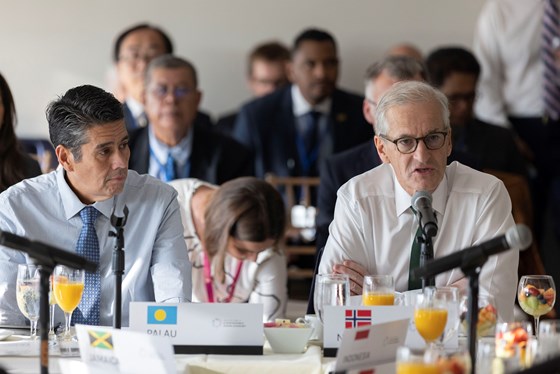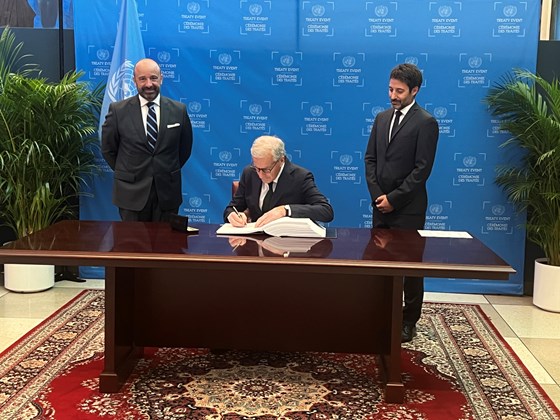Many climate solutions to be found in the oceans
News story | Date: 20/09/2023 | Office of the Prime Minister
According to an updated report from the High-level Panel for a Sustainable Ocean Economy, ocean-based climate solutions can provide 35 % of the cuts in emissions needed to limit global warming to 1.5°C by 2050. The report was presented at the meeting of the Ocean Panel during the UN General Assembly High-level Week.

Prime Minister Jonas Gahr Støre co-chaired the meeting of the Ocean Panel with President of Palau Surangel Whipps Jr. According to the updated report, solutions that are already available for implementation can provide 35 % of the emissions cuts needed to limit global warming by 2050. This corresponds to four times the annual emissions of the EU countries.
Read the report from the Ocean Panel.
‘If the world is to reach the Paris Agreement’s target to limit global warming to well under 2°C, we must take full advantage of the potential to be found in ocean-based solutions. In Norway, efforts are already well underway to accelerate initiatives to promote renewable energy from the oceans and carbon storage below the seabed,’ said Prime Minister Støre.
Ways to achieve the Sustainable Development Goals (SDGs) and prevent the global temperature increase from rising above 1.5°C are key topics for discussion at the high-level meetings of the UN General Assembly. Panel members at this week’s meeting of the Ocean Panel discussed concrete measures for intensifying efforts to advance ocean-based climate action.
‘It was interesting and encouraging to hear the input from my colleagues on the Ocean Panel about how the various countries are working to increase their efforts to use ocean-based solutions to combat climate change. An important understanding that has emerged, and one that I agree with, is that these solutions must be implemented in a way that also supports broader social, environmental and sustainable development goals,’ said Mr Støre.
During the meeting Mr Støre officially welcomed Seychelles as a new panel member.
‘It is a great pleasure to welcome the President of the Republic of Seychelles Wavel Ramkalawan to the Ocean Panel. Seychelles is experiencing first-hand the impacts of climate change and how this is affecting the oceans and people’s livelihoods. Seychelles has shown its commitment to promoting ocean sustainability and political willingness to translate ambitions into concrete action. We can learn a great deal from one another and I look forward to working together,’ said Mr Støre.

The Prime Minister also took the opportunity to sign the newly adopted international marine biodiversity agreement (BBNJ Agreement) on the conservation and sustainable use of marine biodiversity in areas beyond national jurisdiction. The agreement will be important as a framework for establishing marine protected areas and other area-based management tools in areas beyond national jurisdiction. It will help us to achieve the target to conserving and managing 30 % of the oceans by 2030, a political target that Norway has endorsed.
‘I am very pleased to sign this agreement on behalf of Norway. We have chosen to be an early signatory because we consider this agreement, the law of the sea and sustainable ocean management to be of the utmost importance. This agreement is a victory for international cooperation in these challenging times,’ said the Prime Minister.